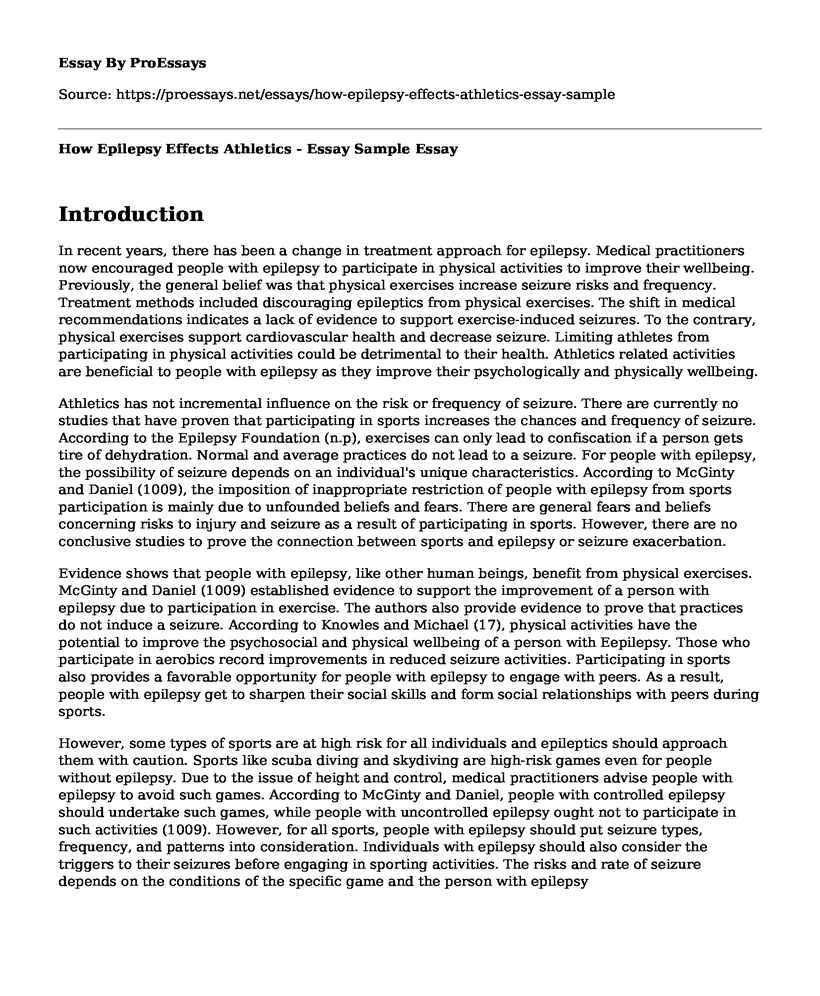Introduction
In recent years, there has been a change in treatment approach for epilepsy. Medical practitioners now encouraged people with epilepsy to participate in physical activities to improve their wellbeing. Previously, the general belief was that physical exercises increase seizure risks and frequency. Treatment methods included discouraging epileptics from physical exercises. The shift in medical recommendations indicates a lack of evidence to support exercise-induced seizures. To the contrary, physical exercises support cardiovascular health and decrease seizure. Limiting athletes from participating in physical activities could be detrimental to their health. Athletics related activities are beneficial to people with epilepsy as they improve their psychologically and physically wellbeing.
Athletics has not incremental influence on the risk or frequency of seizure. There are currently no studies that have proven that participating in sports increases the chances and frequency of seizure. According to the Epilepsy Foundation (n.p), exercises can only lead to confiscation if a person gets tire of dehydration. Normal and average practices do not lead to a seizure. For people with epilepsy, the possibility of seizure depends on an individual's unique characteristics. According to McGinty and Daniel (1009), the imposition of inappropriate restriction of people with epilepsy from sports participation is mainly due to unfounded beliefs and fears. There are general fears and beliefs concerning risks to injury and seizure as a result of participating in sports. However, there are no conclusive studies to prove the connection between sports and epilepsy or seizure exacerbation.
Evidence shows that people with epilepsy, like other human beings, benefit from physical exercises. McGinty and Daniel (1009) established evidence to support the improvement of a person with epilepsy due to participation in exercise. The authors also provide evidence to prove that practices do not induce a seizure. According to Knowles and Michael (17), physical activities have the potential to improve the psychosocial and physical wellbeing of a person with Eepilepsy. Those who participate in aerobics record improvements in reduced seizure activities. Participating in sports also provides a favorable opportunity for people with epilepsy to engage with peers. As a result, people with epilepsy get to sharpen their social skills and form social relationships with peers during sports.
However, some types of sports are at high risk for all individuals and epileptics should approach them with caution. Sports like scuba diving and skydiving are high-risk games even for people without epilepsy. Due to the issue of height and control, medical practitioners advise people with epilepsy to avoid such games. According to McGinty and Daniel, people with controlled epilepsy should undertake such games, while people with uncontrolled epilepsy ought not to participate in such activities (1009). However, for all sports, people with epilepsy should put seizure types, frequency, and patterns into consideration. Individuals with epilepsy should also consider the triggers to their seizures before engaging in sporting activities. The risks and rate of seizure depends on the conditions of the specific game and the person with epilepsy
Conclusion
In conclusion, athletics improve the wellbeing of people with epilepsy. Athletics improves the physical, mental, and psychosocial safety of an individual. People with epilepsy get to enjoy the company of their peers and form new relationships during sporting activities. Though epilepsy calls for people to exercise caution in their operations, engaging in physical activities is healthy for people with epilepsy. However, it is essential to take considerations of the type of sport and the individual's unique conditions. Having considered all precautions necessary, games have no significant relationship with risk and frequency of seizure. To the contrary, playing activities are beneficial to people with epilepsy as they improve their wellbeing psychologically and physically.
Works Cited
Epilepsy Foundation. "Playing Sports and Other Activities." Epilepsy. https://www.epilepsy.com/living-epilepsy/parents-and-caregivers/about-kids/playing-sports-and-other-activities. Accessed 20 Feb. 2019.
Knowles, Byron Don, and Michael D. Pleacher. "Athletes with Seizure Disorders." Current Sports Medicine Reports, vol. 11, no.1, 2012, pp. 16-20.
McGinty, Ronan N., and Daniel J. Costello. "Elite Athletes and Epilepsy." Epilepsia, vol. 57, no. 6, 2016, pp. 1009-1010.
Cite this page
How Epilepsy Effects Athletics - Essay Sample. (2022, Nov 29). Retrieved from https://proessays.net/essays/how-epilepsy-effects-athletics-essay-sample
If you are the original author of this essay and no longer wish to have it published on the ProEssays website, please click below to request its removal:
- Drugs, Alcohol and Drug Abuse
- Nutrition Assessment Paper Example
- Essay Sample on Cancer: Diagnosis, Staging, Complications, Treatment & Care
- Essay Sample on Social Media: A Preferred Practice for Modern Health Care
- Essay on a Childhood Dream Realized: Pursuing Pediatric Dentistry
- Essay on Oxycontin: A Drug Used to Relieve Pain of Chronic Diseases
- Connor's Parents Dismissed for Failing to Exhaust Claims Under IDEA - Essay Sample







